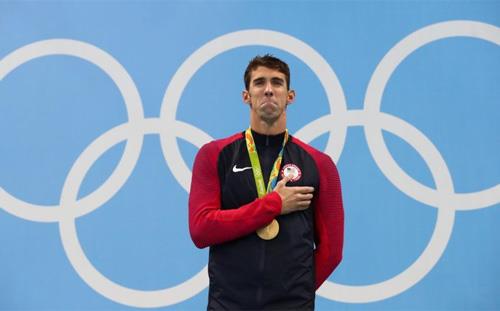
Almost everyone knows the feeling of a letdown after a big event ends. You've been focusing on it for so long that once it actually happens, there's an inevitable after-sense of "okay, what now?"
Perhaps most notably, it happens to women after they've had babies. But it can happen to anyone, triggered by something as relatively fleeting as an anniversary party or as life-changing as leaving a job.
The Weight of Gold, an HBO Sports documentary that premieres at 9 p.m. ET on Wednesday, suggests that it can happen to people whose event unfolds on a bigger scale.
Specifically, The Weight of Gold suggests that post-event depression can have a profound and even deadly impact on Olympic athletes.
The narrator of this hour-long documentary, which focuses on the stories and thoughts of a dozen U.S. Olympic athletes, has the cred to discuss the subject.
It's Michael Phelps (top), the swimmer who has won more medals than anyone in Olympic history.
The dedication and laser focus of the training that enabled him to win those medals, Phelps says here, came at a high and long-hidden cost.
It left him feeling, he says, like he was only a swimmer, not a regular human being. So when the Olympics ended, and there were no more goals for him to swim toward, he felt empty.
After racking up a couple of DUIs, he says, he went home one night and thought about suicide, feeling like there was nothing to keep living for.
Fortunately, he was convinced to seek help, and after 45 days in rehab, he says he emerged with a much better understanding of both himself and the wider issue of mental health.
The Weight Of Gold often plays like a public service message for mental health awareness, asserting there's no shame in either having issues or seeking help.
The athletes here, who include figure skating silver medalist Sasha Cohen, speed-skating gold medalist Apolo Anton Ohno, skateboarding gold medalist Shaun White, skier Bode Miller, skeleton gold medalist Katie Uhlaender, hurdler Lolo Jones, and others, all say that the Olympic program, while it's world-class for physical care, shows little interest in mental health.
It notes that five Olympians have committed suicide over the last few years and, in each case, after expressing concern about their mental well-being.
The message delivered by Phelps in his narration is two-pronged.
First, Olympic athletes have the same emotions and human responses as people who couldn't swim across a kiddie pool.
But second, Olympic athletes, by definition, have such drive and focus on their sport and their skill that they often suppress everything else for years in pursuit of the gold medal.
So while post-event depression for athletes reflects a normal and even common human response, it may be more intense because it explodes all at once.
Brett Rapkin's documentary touches on other concerns of Olympic athletes. Jones talks about the financial sacrifice through the training years, recalling how she once watched herself winning a race on TV in the gym where she was working behind the smoothie counter for $8 an hour.
Ohno says the vision of fame and fortune for Olympic medalists is a myth for all but the tiniest handful. If you win a gold in a prominent sport, he says, you may get a brief burst of fame and an endorsement or two. In most cases, he says, all you can do is take a deep breath, enjoy whatever success you had, and plan the next phase of your life.
There are brief references to the mental health impact of training all your life and then not winning a medal. But that impact is mostly wrapped into the larger point articulated by Phelps: that the letdown for any Olympian, win or lose, can be jarring and, in extreme cases, lethal.
Nothing in The Weight of Gold disparages sports or athletic achievement or the incredible discipline required to become world-class. It just suggests we shouldn't assume that achievement comes without a cost.